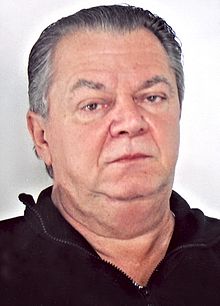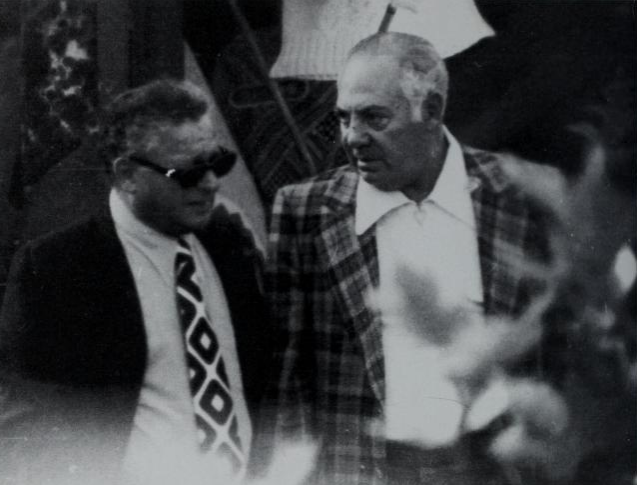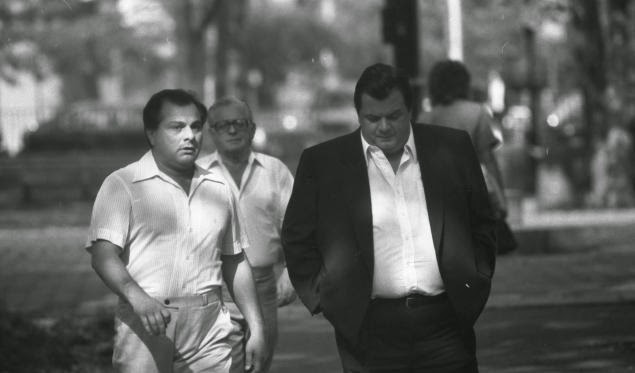Joe Massino came from a working-class Maspeth background, the second of three sons of a second-generation Italian-American couple. He survived and thrived in a longtime career in the American Mafia, rising to the epitome when he became boss of the Bonanno crime family. In the early 1990s, when most of the other New York bosses were incarcerated, Massino stood alone as the most powerful Mafioso on the street.
He helped protect and defend Rastelli's throne, playing a key role in a series of murders of Rastelli rivals, including Carmine Galante in 1979 (which we will focus on shortly) and
three rebellious capos slain in one fell swoop in a mini-
St. Valentine's Day-like massacre in 1981.
Massino brought to the table strong qualities that doubtlessly helped him rise in street life. His formal education may have ended during his sophomore year at Grover Cleveland, but he was intelligent and had a photographic memory and compelling powers of recall.
Massino also wasn’t the sloppy, gruff street guy he appeared to be, and was known to be soft-spoken and polite, a gentleman who never barked—even at the lawmen who surveilled, arrested, and interrogated him. (Massino, after cleanly escaping one aggressive surveillance effort, later on even apologized to the officer who had been trying to catch him.)
"He looked like a schlub, but he was sharper than you can imagine," a Bonanno source who requested anonymity recently told us of Massino, noting that during downtime, Massino showed a much lighter side. "He would tell jokes and show card tricks."
 |
| Massino's FBI mugshot in 2003. |
Massino apparently could gear himself to the needs of the moment.
Some very scary tough guys were very scared to talk out of school about him. Ray Wean was a six-feet-tall, 350-pound head cracker who worked for Massino. “Wean’s so big, I can’t handcuff him," an agent once said. Wean, who was not Italian and obviously not a made member, was willing to snitch on any mobster on the street. Almost any....“Ray was a monster, a psycho, not afraid of anything,” said Pat Colgan, a retired FBI supervisor who tailed Massino for more than a decade. "Yet he was scared to death of Joey for good reasons."
Massino hooked up with Philip Rusty Rastelli in the early 1970s as Rusty was on the rise and was finally straightened out in 1977 by Carmine Galante. By then, Big Joey, aka The Ear, was known to the FBI as a hijacker “kingpin” who specialized in liquor and ground-coffee hauls. Massino and his hijacking crew were considered the best of the best due largely to Massino's extensive connections (for warehouse space, etc.) and knowledge of New York geography. Massino could find excellent drops, aka places where stolen goods could be unloaded before the theft of the cargo had even been reported.
Massino's superiority as a hijacker fueled his tight relationship with John Gotti, a young Gambino hijacker of the same era.
The two became longtime intimates, but then, later in life, the relationship deteriorated. Massino owed much to John Gotti, though not in a way John Gotti would've appreciated. Watching what happened to John during his run as Gambino boss taught Massino
what not to do. In an intimate chat with Sal Vitale, Massino derided Gotti for violating Cosa Nostra traditions and for arousing so much public attention. “He broke every rule in the book. John destroyed this life. John set us back one hundred years and what he did to Paulie [the murder of boss Paul Castellano] I would never have done.” When Gotti died, Massino boycotted his wake and funeral. (
Of course note that this verbiage was coming from the man who became the first boss in history to flip and testify and wear a wire on his own acting boss.)
 |
| Massino, who came up in the roach coach business, broke that cardinal rule about not getting high on your own supply. |
For decades, the conventional wisdom about the Galante killing went something like this: Galante was free on parole and seized control of the borgata while Rastelli was locked up. There's no question that, at the time at least, Rastelli was the official boss, having been voted into office on February 23, 1974, at a meeting at the Americana Hotel in Manhattan.
(Voting Rusty Rastelli to be boss was a cataclysmic development. His reign was ruinous, fueling murderous purges and losses of lucrative rackets, while Rastelli himself couldn't stay out of jail. Earlier in life, before he kept getting arrested, he was his own worst enemy, and was feared in the Mafia largely for his murderous rages. Then there's
his first wife, a story in and of herself: Connie Rastelli departed dramatically from the traditional interpretation of the homemaking Mafia wife, serving as Rastelli's getaway wheelman, keeping her husband's gambling records, getting narrowly acquitted on a murder charge, beating a rival for her husband's affections unconscious (and subsequently shooting said husband twice). Nevertheless she remained loyal to Rusty to a fault— until Rastelli informed her the marriage was over, whereupon she went to the FBI and talked in detail about various criminal activity, including murder. In March 1962, Connie was shot dead by an unknown assassin and her body was found in the building where she lived. Of course killing a woman violates Mafia code [for whatever that's worth]).
In the mid- to late-1970s, Massino, loyal to his mentor Rastelli, visited him at Lewisburg and delivered messages from the imprisoned boss to the Rastelli loyalists on the streets of New York City.
Lilo learned about the trips and wasn't pleased. He sent word for Massino to come in.
Sal Vitale drove him to the meeting and waited in the car.
“This guy's gonna kill me,” Massino said once back in the car with Vitale. “He doesn’t want me to visit Phil Rastelli in jail."
Rusty “is like my uncle, Massino noted. "He raised me, baptized me. I can’t abandon him; I have to go visit him,” Massino said. In fact, "Unc" was the affectionate nickname Massino always used for Rastelli.
Other times, he was less enamored of his mentor. “How smart can Rastelli really be?” he once complained. “He spent half of his life in jail.” Massino's biting criticism was probably not an accurate marker of his true feelings for his mentor, however. When Massino and Rastelli were on trial together in the 1980s (for the Donnie Brasco case), several times in the courtroom Massino rushed to assist an imperiled Rusty, who was an epileptic. Massino once stunned onlookers by using his tremendous strength to pry open a telephone booth and lift out the trapped Rastelli during a seizure. Massino also comforted Rastelli during his attacks, ensuring he didn't bite his tongue when he collapsed at the defense table.
Massino, who truly feared that the volcanic Galante was going to whack him, delivered a request from Rastelli to the Commission: we need to kill Carmine Galante. That was fine with the Gambinos,
who didn't exactly hold Lilo in high regard for various reasons (including the likely belief that Galante was killing all those Gambino drug dealers). Notably, Massino also had an "in" with the Commission in Gambino boss Paul Castellano for whom Massino had done a big favor by helping get rid of someone Castellano wanted gone.
 |
| Just a coupla wiseguys having some fun in the sun before flipping for the Feds. |
The Commission agreed that Galante needed to go—
the lone dissenter being Colombo boss Carmine Persico, according to the trial testimony of Junior's ex-brother-in-law. Persico's nay notwithstanding, the Commission approved, and on July 12, 1979, Massino was allegedly onsite at that restaurant in Bushwick, probably as a backup shooter or in one of the crash cars, when they took care of Lilo and two lunch companions.
Then, in the realignment that followed, Rastelli rewarded Massino by elevating him to capo.
The only problem with the "conventional" wisdom above is that much of it is completely wrong if you believe what came out the horse's mouth. Massino, on the stand in 2011 at the trial of Vincent Basciano, offered a very different take on the Galante hit. (Which caused us to shred the third and final installment in our series, which otherwise would've been completed about a month ago and published. As noted previously, after we complete this series, we will republish the installments as a single story.)
Massino began cooperating with the authorities after his 2004 convictions for seven murders, for which he faced life in prison. Massino, who was once upon a time in the process of renaming the Bonanno family the Massino family, was set to go to trial for an eighth murder, for which he could have faced the death penalty. Instead, in 2005, he pleaded guilty to the eighth killing, and Judge Garaufis of Federal District Court, who also presided over Basciano’s trial, sentenced Massino to two consecutive life terms. By testifying for the government, Massino was seeking a sentence reduction, though nothing had been promised to him. As he told the jury, “I’m hoping to see a light at the end of the tunnel.”
 |
An "ailing" Phil Rastelli in the hospital in the mid-1980s.
|
Massino secretly recorded Basciano, whom he was testifying against, while the two were engaged in a prison house chat about the 2004 killing of Randolph Pizzolo, a Bonanno associate whom Basciano was charged with ordering the murder of.
While Basciano never could have guessed that the boss he was chatting with had flipped and was wearing a wire, Massino's sudden curiosity about a recent gangland hit seemed to set off Vinny Gorgeous's
Spidey sense. Discussing murder generally
ist verboten among wiseguys, as John Gotti apparently learned too late. Basciano was truly fcked: Massino was THE BOSS and when a boss interrogates a member, the member who balks is on thin ice. Massino cleverly counted on Cosa Nostra's own norms and traditions to completely trap Basciano.
The following is based on Massino's testimony, which can be found on
this Reddit page, which includes a transcript of the testimony as well as an audio-only recording. We're mostly focusing on Massino's testimony around the Rastelli-Galante feud for now. Also, we trust the source material because it is
linked directly to the Black Hand forum (specifically
user "B"). We join the Redditor in giving B a "seriously big shoutout .... for putting in the work..." We also join him in
recommending the Black Hand forum....
Massino met Rastelli in 1972 or 1973, via Rastelli's nephew Louis. It was a less-than-auspicious encounter in that Rastelli suspected Massino of involvement in a death penalty offense, the off-the-record murder of Bonanno associate Tommy Zummo. Rusty even indirectly threatened to kill Massino, telling him that if he ever found out who was behind the Zummo murder, he already had Commission approval to murder the perpetrator(s). Massino lied to Rastelli, telling him he didn't even know Zummo. In actuality, Big Joey knew quite a bit and was the very perpetrator Rastelli was hunting. At the time Massino was so green, he didn't know what the Commission was. (Rastelli mentioning the Commission to a young associate probably wasn't the smartest thing to do.)
Anthony DeStefano, who has written several excellent mob nonfiction books, including on Massino and Basciano, covered Massino's testimony, including on the Zummo murder: "Massino committed his first homicide in the 1960s, the killing of one Tommy Zummo, a Bonanno associate who he said was killed in the lobby of a Queens building. Massino said he feared getting caught when the clip fell out of the handgun which had his fingerprints. Nothing happened. The late Philip Rastelli one day told Massino he was looking into who killed Zummo and if he discovered who did it would kill the person. Rastelli never found out and ironically became Massino's protector and mentor."
 |
| Vinny Basciano with a former wife and his two children. |
Massino said (incorrectly) that Rastelli was the official boss of the Bonanno family when he first met him in 1972 or 1973. Rastelli didn't become official boss until the formal vote at the Americana Hotel in early 1974. Still, Rastelli was helping to run the family as part of a triumvirate and then as an acting boss prior to his formal ascension, so Massino's error isn't a major discrepancy.
Despite the seemingly bad first meeting, Rastelli and Massino grew tight quickly nevertheless--or at least Rastelli put Massino on record with him also in 1973. He informed Massino of the development while Massino was attending a party at Rastelli's Brooklyn home. Rastelli invited Massino into the yard to tell him of his new status in the Bonanno family. Massino thanked Rastelli.
Massino said the books were reopened in 1975 for the first time in 19 years. He was proposed by Rastelli as part of the first wave of inductions but claimed he turned the offer down because he didn't think he needed a button, especially given his relationship to Rastelli. Massino changed his mind after Rastelli was convicted and Rastelli told him he needed him to be his eyes and ears on the street.
After he was straightened out, Massino was put under Nicholas (Nicky Glasses) Marangello for six months, then was put under Carmine Galante, who Massino identified as "the boss." Massino said he was under Galante also for six months, then was placed in
Philip (Phil Lucky) Giaccone's crew for yet another six-month period. Then he was put in the crew of Jimmy Galante. Massino said Carmine Galante was behind his moving to the different crews. (Though all that while, of course, Massino was really under
Unc.)
Massino was specifically asked about Galante's position at the time, and he said "boss," though in the next breath, he claimed Rastelli, who he continued visiting in prison, was the "official boss."
Massino, who went to see Rastelli in prison only a week or two after he was made, said that he actually asked Rastelli point blank, whether Galante was the official boss. Rastelli said that he (Rastelli) was the boss, not Lilo.
Galante straightened out Massino on June 14, 1977 in a bar in Queens. Also made at that ceremony were Anthony Spero, Joe Chilli, and three others.
Massino testified that, at his induction, Galante asked each inductee who the boss of the Bonanno family was, and each of them replied, "you."
Massino, however, replied "Rastelli."
Galante said "you're right," but that as of the previous week, Galante was now the boss. Based on Galante's comment, he started asserting himself as boss in early June 1977.
 |
| Nicky Glasses Marangello, left, and Stevie Beefs. |
When Galante went to prison on parole violations in 1977 (he was let out some months later) Massino said that Nicky Glasses set up a three-man panel to run things for Lilo that included Marangello,
Mickey Zaffarano, and Stefano (Stevie Beefs) Cannone.
Massino said he was not involved in the Galante murder, he "just knew about it" in advance. Rastelli had told him about the plot during a prison visit. Rastelli claimed the reason for killing Lilo was that he had basically tried to steal the position away from Rastelli. (Galante had taken "his position" and "made himself the boss.")
Rastelli told Massino that
Alphonse (Sonny Red) Indelicato and Phil Giaccone were going to kill Galante.
On the day Galante was murdered,
Dominick (Sonny Black) Napolitano stopped by Massino's deli.
"They just killed Carmine Galante," he told Massino.







Comments
Post a Comment